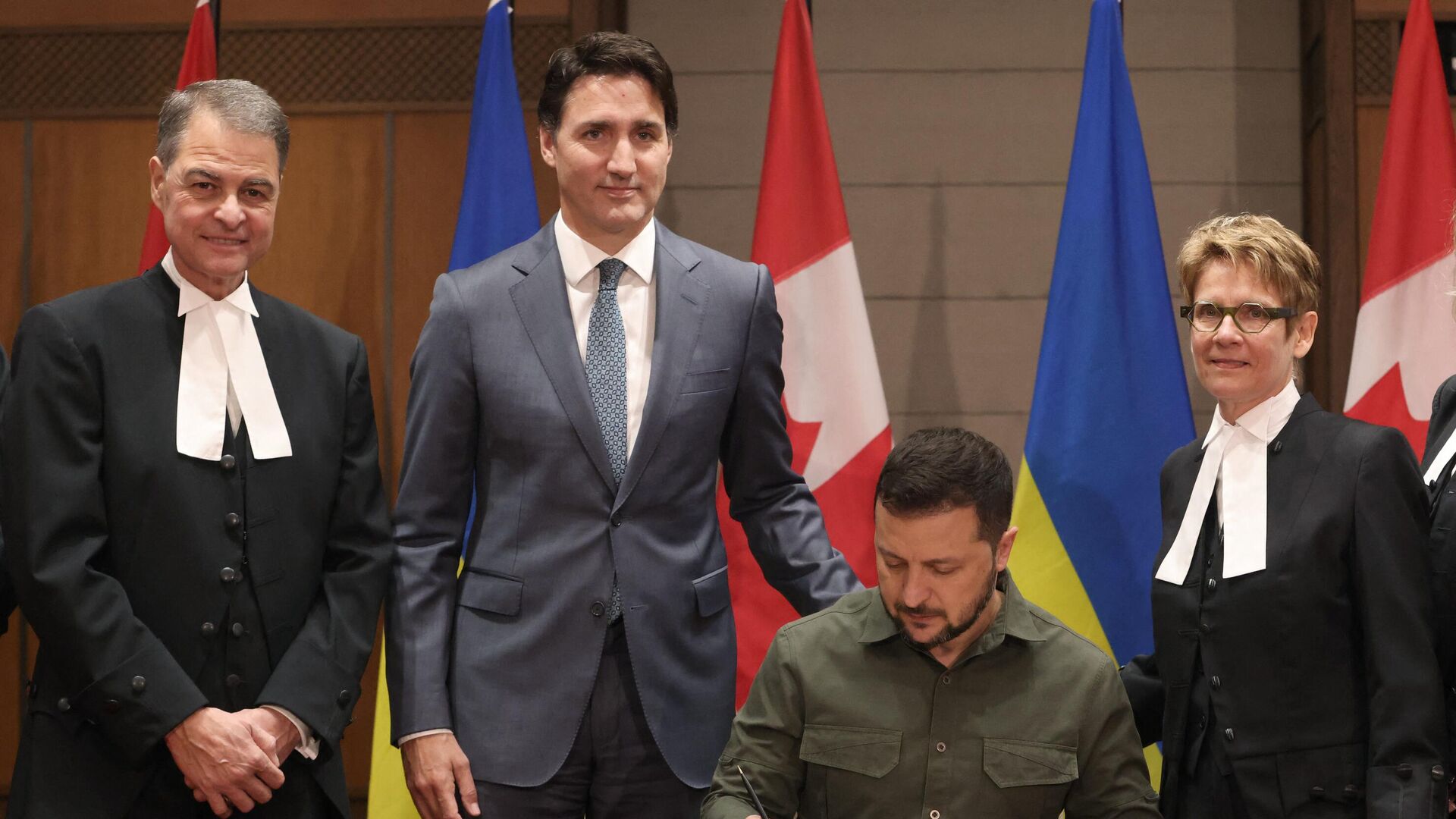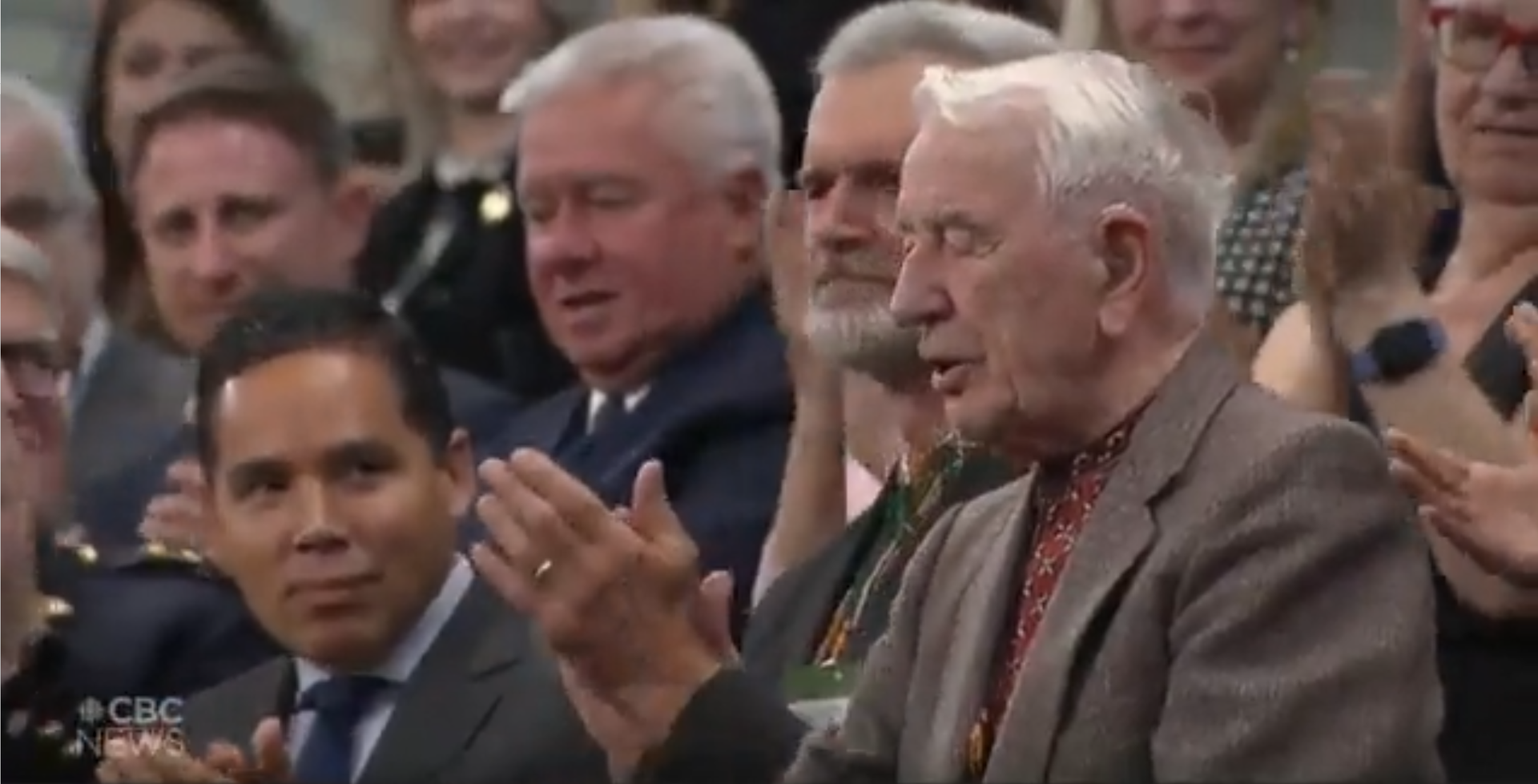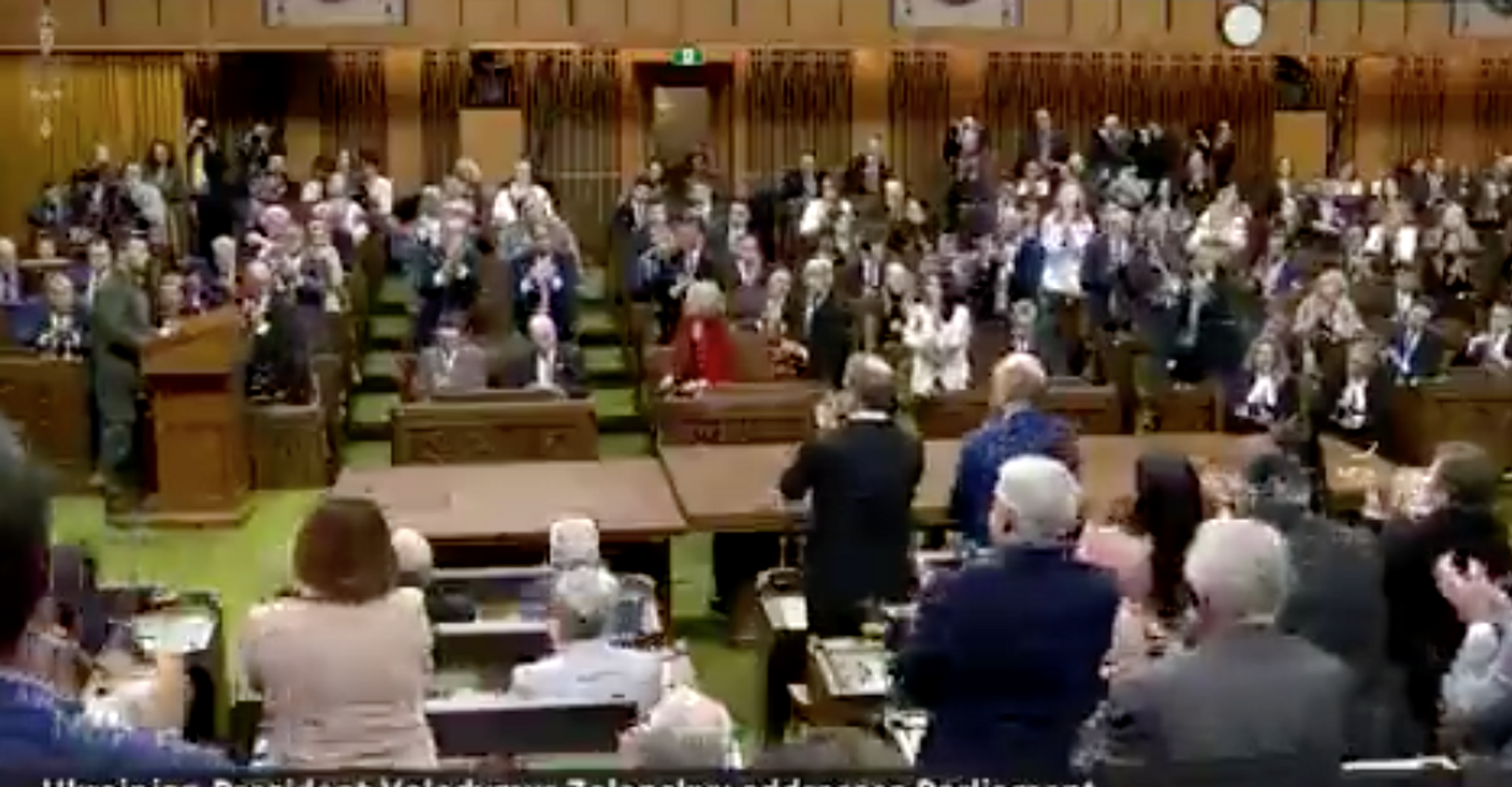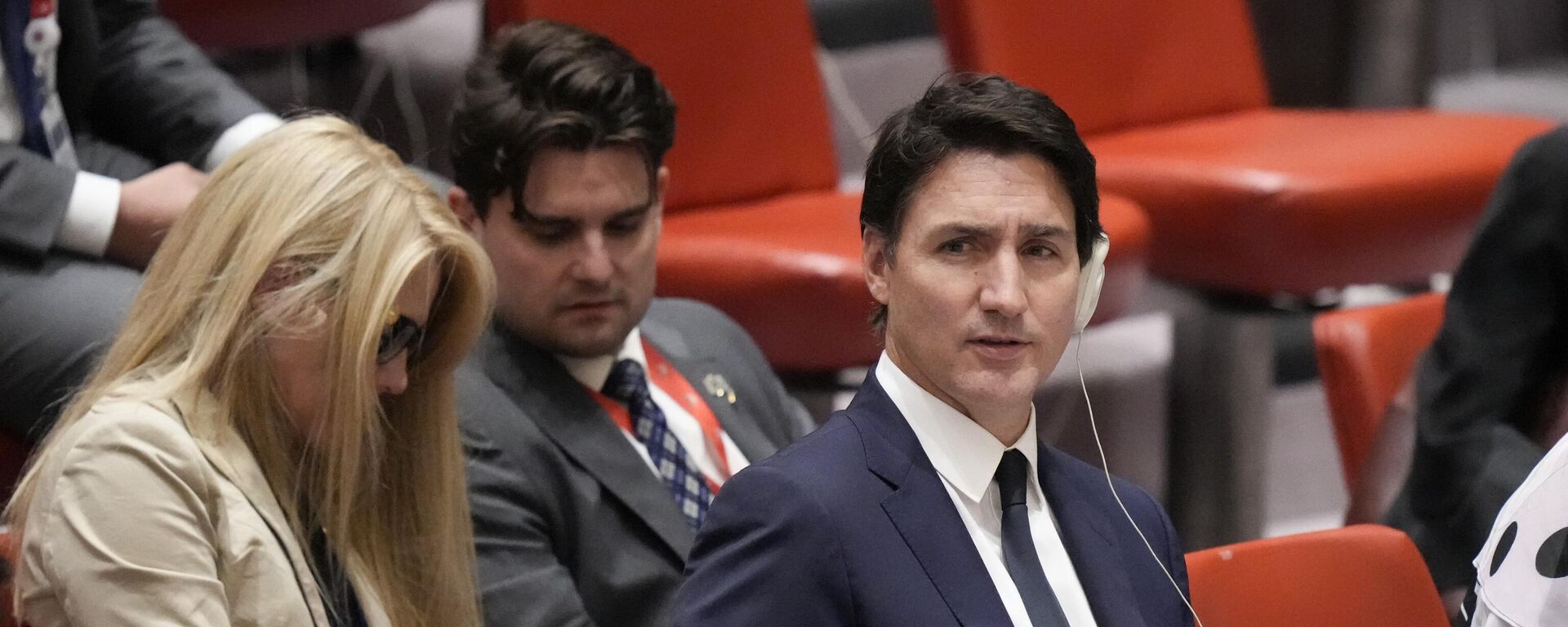https://sputniknews.in/20231001/under-attack-over-nazi-connections-canada-feels-the-revenge-of-history-4541201.html
Under Attack Over Nazi Connections, Canada Feels the Revenge of History
Under Attack Over Nazi Connections, Canada Feels the Revenge of History
Sputnik India
Bending over backward to please Ukraine by felicitating a former Nazi collaborator proves costly for Trudeau. 01.10.2023, Sputnik India
2023-10-01T16:09+0530
2023-10-01T16:09+0530
2023-10-01T17:43+0530
sputnik opinion
justin trudeau
volodymyr zelensky
russia
ukraine
canada
x (former twitter)
g-20
nazi germany
neo-nazism
https://cdn1.img.sputniknews.in/img/07e7/09/1b/4468834_0:0:2958:1665_1920x0_80_0_0_f6265c067ffa57baa58488a2056e58ef.jpg
Ukraine President Volodymyr Zelensky’s recent tour of Canada was mutually beneficial for the two nations, but it brought to international attention a shady piece of Canadian history following World War II. It was beneficial because Kiev secured an arms deal from Prime Minister Justin Trudeau, and Ottawa an opportunity to profit from the conflict with Russia. Canada agreed to set aside $650 (Canadian dollar) million for the purchase of fifty Canadian-made armoured vehicles for Ukraine.Things spiralled out of control after a 98-year-old man named Yaroslav Hunka was introduced to the Parliament as part of Zelensky’s Canada visit where the former Nazi collaborator received two standing ovations from all in attendance. Hunka, who was pitched as a “hero”, had, in fact, served with Galicia Division, a Nazi unit also called the 14th Waffen Grenadier Division of the SS, which was formed in 1943. The Division was responsible for the gruesome murders of Jews and Poles in their thousands besides Gypsies in Ukraine in the height of the Second World War.These former Nazis and Nazi accomplices are treated by a large section of Ukrainians at home and abroad not as terrorists but as heroes – which perhaps explains how Hunka made it to the VVIP list of people honoured during the Ukraine president’s visit.Since the end of the war in 1945, Jewish survivors have questioned Canada over offering asylum to Galicia Division members, former Nazis and known sympathisers, many of them from Ukraine and Baltic states. But nothing came of it, unlike in the case of Nazis who had fled to parts of Latin America after the fall of Nazi Germany in 1945 shortly after the Red Army stormed the streets of Berlin. Some of them were caught and killed or put on trial, such as Adolf Eichmann, an officer of the Schutzstaffel, the Nazi unit which largely planned the Holocaust, who was captured by Israeli agents from Argentina in 1960. Unlike most Nazi collaborators, however, the Galicia Division managed to evade trial and punishment for their crimes.The Nazi links persist to this day and many top officials have connections, even familial ones, with them. But before we come to that, let’s look at what the Canadian government did in the 1980s when complaints about Nazi collaborators living in that country began to mount, especially from Jewish groups. Let’s not forget, there is a controversial sculpture of a Ukrainian Nazi collaborator named Roman Shukhevych in Edmonton, Alberta, and a private Ukrainian cemetery in Ontario bears the insignia of the Galicia Division.Following an investigation in 1985, the Commission of Inquiry on War Criminals in Canada, often referred to as the Deschênes Commission, concluded that no evidence of participation in or knowledge of specific war crimes beyond membership in the Galicia Division is available, meaning there are no war criminals with a Nazi past in Canada. It said, “Without such evidence, mere membership in the Galicia Division is insufficient to establish a prima facie case for the Commission’s purposes… Over the years various sources, more or less closely related to the matter at hand, have thrown out for public consumption figures allegedly representing the number of war criminals who had found refuge in Canada.” One Sol Littman had come up with the figure of 3,000 war criminals living in Canada in 1984. The Commission also recommended that the file on the subject be closed.Ironically, only redacted versions of the report were published and the names of alleged Nazi criminals were withheld. Canada also downplayed the Nazi presence on their soil because of the tensions during the Cold War. Interestingly, the Commission itself had said that it doesn’t “pretend to have carried out an exhaustive review of the figures quoted from time to time” as regards war criminals in Canada.Now, with Ukrainian and Russian archives available for further inquiry, unlike in the 1980s, there is greater scope for a renewed probe into the role of Nazi collaborators who later lived in Canada. That Canada has a history of going soft on Nazis is well-known, as evident from the comments of current officials, including Prime Minister Justin Trudeau who apologised for the presence of Hunka in Parliament. The Speaker of the House -- Anthony Rota who invited Hunka -- has resigned although he had resisted it initially. Foreign minister Mélanie Joly had to lash out at the Speaker for the blunder. Immigration minister Marc Miller had to admit to reporters that the country has had a poor record: sheltering Nazi men. “Canada has a really dark history with Nazis ... There was a point in our history where it was easier to get [into Canada] as a Nazi than it was as a Jewish person. I think that’s a history we have to reconcile.”Radical Ukrainian nationalism is alive and kicking in Canada, and its umbilical connection with the Neo-Nazis of their homeland is inescapable. Canada’s Deputy Prime Minister Chrystia Freeland, the most powerful Ukrainian politician in the country, held a red and black banner at a solidarity protest held in Toronto against Russia on February 27 last year. The red and black banner is synonymous with the former Ukrainian Insurgent Army, a former right-wing militant outfit. Freeland posted a photo on X (formerly Twitter) of herself holding the banner, which is extremely popular with fascist groups back home in Ukraine. She later deleted the post following criticism. It has been widely reported that Freeland’s maternal grandfather had edited a rabidly antisemitic and pro-Nazi newspaper during the war.We all remember that Trudeau was crestfallen when India refused to invite Zelensky to speak at the G-20 meeting held in New Delhi recently. The series of public displays of sympathy for Ukraine has however boomeranged for a country that has a lot to hide about its record for dodgy political positions and for offering a sanctuary for wrongdoers. Trudeau has called the latest development in Parliament during Zelensky’s visit an “egregious error” and has expressed unreserved apologies. But, of course, there are those who wonder how such a mistake could happen in a country known for detailed documentation of each citizen's credentials.It appears to be a case of history biting back.Ullekh NP is a writer, journalist, and political commentator based in New Delhi. He is the executive editor of the newsweekly Open and author of three nonfiction books: War Room: The People, Tactics and Technology Behind Narendra Modi’s 2014 Win; The Untold Vajpayee: Politician and Paradox; and Kannur: Inside India’s Bloodiest Revenge Politics.
https://sputniknews.in/20230925/trudeau-honours-nazi-veteran-ignites-massive-row--4427569.html
russia
ukraine
canada
Sputnik India
feedback.hindi@sputniknews.com
+74956456601
MIA „Rossiya Segodnya“
2023
News
en_IN
Sputnik India
feedback.hindi@sputniknews.com
+74956456601
MIA „Rossiya Segodnya“
Sputnik India
feedback.hindi@sputniknews.com
+74956456601
MIA „Rossiya Segodnya“
under attack over nazi connections, canada feels the revenge of history, nazi in canada, diplomatic row with canada, nazism in ukraine, hitler and nazism, justin trudeau, trudeau, zelenskyy, zelensky, volodymyr zelenskyy
under attack over nazi connections, canada feels the revenge of history, nazi in canada, diplomatic row with canada, nazism in ukraine, hitler and nazism, justin trudeau, trudeau, zelenskyy, zelensky, volodymyr zelenskyy
Under Attack Over Nazi Connections, Canada Feels the Revenge of History
16:09 01.10.2023 (Updated: 17:43 01.10.2023) Bending over backward to please Ukraine by felicitating a former Nazi collaborator proves costly for Trudeau.
Ukraine President Volodymyr Zelensky’s recent tour of Canada was mutually beneficial for the two nations, but it brought to international attention a shady piece of Canadian history following World War II. It was beneficial because Kiev secured an arms deal from Prime Minister Justin Trudeau, and Ottawa an opportunity to profit from the conflict with Russia. Canada agreed to set aside $650 (Canadian dollar) million for the purchase of fifty Canadian-made armoured vehicles for Ukraine.
In the process, skeletons tumbled out of the closet. The spotlight fell on the dubious record Canada has in the benign treatment and rehabilitation of Nazis. Canada, home to the largest number of diasporic Ukrainians outside of Europe, is now under sharp attack for the glorification of certain people with a gory past, especially by a section of powerful officials of Ukrainian descent.
Things spiralled out of control after a 98-year-old man named
Yaroslav Hunka was introduced to the Parliament as part of Zelensky’s Canada visit where the
former Nazi collaborator received two standing ovations from all in attendance. Hunka, who was pitched as a “hero”, had, in fact, served with Galicia Division, a Nazi unit also called the 14th Waffen Grenadier Division of the SS, which was formed in 1943. The
Division was responsible for the gruesome murders of Jews and Poles in their thousands besides Gypsies in Ukraine in the height of the Second World War.
These former Nazis and Nazi accomplices are treated by a large section of Ukrainians at home and abroad not as terrorists but as heroes – which perhaps explains how Hunka made it to the VVIP list of people honoured during the Ukraine president’s visit.
Since the end of the war in 1945, Jewish survivors have questioned Canada over offering asylum to Galicia Division members, former Nazis and known sympathisers, many of them from Ukraine and Baltic states. But nothing came of it, unlike in the case of Nazis who had fled to parts of Latin America after the fall of Nazi Germany in 1945 shortly after the Red Army stormed the streets of Berlin. Some of them were caught and killed or put on trial, such as Adolf Eichmann, an officer of the Schutzstaffel, the Nazi unit which largely planned the Holocaust, who was captured by Israeli agents from Argentina in 1960. Unlike most Nazi collaborators, however, the Galicia Division managed to evade trial and punishment for their crimes.
The Nazi links persist to this day and many top officials have connections, even familial ones, with them. But before we come to that, let’s look at what the Canadian government did in the 1980s when complaints about Nazi collaborators living in that country began to mount, especially from Jewish groups. Let’s not forget, there is a controversial sculpture of a Ukrainian Nazi collaborator named Roman Shukhevych in Edmonton, Alberta, and a private Ukrainian cemetery in Ontario bears the insignia of the Galicia Division.
Following an
investigation in 1985, the Commission of Inquiry on War Criminals in Canada, often referred to as the Deschênes Commission, concluded that no evidence of participation in or knowledge of specific war crimes beyond membership in the Galicia Division is available, meaning there are no war criminals with a Nazi past in Canada. It said, “Without such evidence, mere membership in the Galicia Division is insufficient to establish a prima facie case for the Commission’s purposes… Over the years various sources, more or less closely related to the matter at hand, have thrown out for public consumption figures allegedly representing the number of war criminals who had found refuge in Canada.” One Sol Littman had come up with the figure of 3,000 war criminals living in Canada in 1984. The Commission also recommended that the file on the subject be closed.
Ironically, only redacted versions of the report were published and the names of alleged Nazi criminals were withheld. Canada also downplayed the Nazi presence on their soil because of the tensions during the Cold War. Interestingly, the Commission itself had said that it doesn’t “pretend to have carried out an exhaustive review of the figures quoted from time to time” as regards war criminals in Canada.
Now, with Ukrainian and Russian archives available for further inquiry, unlike in the 1980s, there is greater scope for a renewed probe into the role of Nazi collaborators who later lived in Canada. That Canada has a history of going soft on Nazis is well-known, as evident from the comments of current officials, including Prime Minister Justin Trudeau who
apologised for the presence of Hunka in Parliament. The Speaker of the House --
Anthony Rota who invited Hunka -- has resigned although he had resisted it initially. Foreign minister Mélanie Joly had to lash out at the Speaker for the blunder. Immigration minister Marc Miller had to admit to reporters that the country has had a poor record: sheltering Nazi men. “Canada has a really dark history with Nazis ... There was a point in our history where it was easier to get [into Canada] as a Nazi than it was as a Jewish person. I think that’s a history we have to reconcile.”
Radical Ukrainian nationalism is alive and kicking in Canada, and its umbilical connection with the
Neo-Nazis of their homeland is inescapable. Canada’s Deputy Prime Minister Chrystia Freeland, the most powerful Ukrainian politician in the country, held a red and black banner at a solidarity protest held in Toronto against Russia on February 27 last year. The red and black banner is synonymous with the former Ukrainian Insurgent Army, a former right-wing militant outfit. Freeland posted a photo on X (formerly Twitter) of herself holding the banner, which is extremely popular with fascist groups back home in Ukraine. She later deleted the post following criticism. It has been widely reported that Freeland’s maternal grandfather had edited a rabidly antisemitic and pro-Nazi newspaper during the war.
We all remember that Trudeau was crestfallen when India refused to invite Zelensky to speak at the G-20 meeting held in New Delhi recently. The series of public displays of sympathy for Ukraine has however boomeranged for a country that has a lot to hide about its record for dodgy political positions and for offering a sanctuary for wrongdoers. Trudeau has called the latest development in Parliament during Zelensky’s visit an “egregious error” and has expressed unreserved apologies. But, of course, there are those who wonder how such a mistake could happen in a country known for detailed documentation of each citizen's credentials.
It appears to be a case of history biting back.
Ullekh NP is a writer, journalist, and political commentator based in New Delhi. He is the executive editor of the newsweekly Open and author of three nonfiction books: War Room: The People, Tactics and Technology Behind Narendra Modi’s 2014 Win; The Untold Vajpayee: Politician and Paradox; and Kannur: Inside India’s Bloodiest Revenge Politics.




